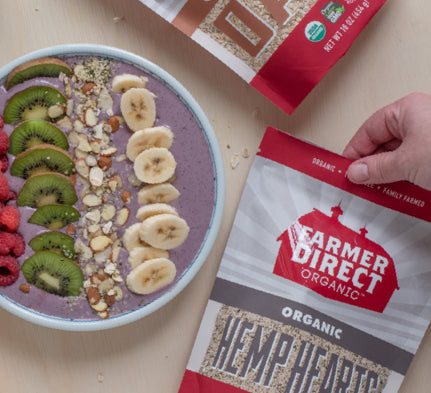FAQs
How long do you soak lentils?
Lentils don’t need to be soaked, but some people prefer it to reduce the cooking time and/or to aid in digestion. Without soaking, lentils will cook in 15 to 45 minutes, depending on type. Soaking whole lentils for 2 to 4 hours can cut cooking time in half and is recommended if your lentils are past their “best by” date. It’s not necessary to soak split red lentils because they have the shortest cooking time and will naturally break down into a puree when cooked.
How long do you soak beans?
All types of beans have the same soaking recommendations. Beans prepared before their “best by” date may be soaked for 4 to 8 hours or up to 12. Older beans may need up to 12 hours of soaking. For a “quick soak” method, cover beans with fresh water and bring to a boil for 5 minutes, cover, turn off heat, and let sit for 1 to 4 hours.
Where are your crops grown?
We work with family farmers in the United States and Canada to bring you the highest quality certified organic products.
How can I be assured that your product is actually organic?
The USDA Organic and Canada Organic programs are some of the strictest organic standards in the world. Farms must go through a rigorous transition period, they cannot use synthetic pesticides, herbicides or fungicides (along with a host of other banned substances), and must take measures to prevent cross-contamination from non-organic crops. Farms as well as processors are audited by a third-party certifier every single year in order to maintain their certification, which means lots of paperwork. And for processors, there are strict rules for handling the organic products, cleaning equipment, and keeping organic and non-organic products separate. When you see the USDA Organic or Canada Organic seals, you can be assured that the people behind these products have done the hard work to ensure your foods are organic from farm to shelf.
How does your proprietary lot numbering system work?
Our proprietary lot numbering system allows us to trace Farmer Direct Organic products at every stage of production, all the way back to the exact field where they were grown. No other grain company can provide this level of transparency. Learn more about our lot numbering system here.
What do your best by dates mean? Do your products expire?
Our products will have their best quality, flavor, nutrition and cooking consistency when prepared before the “best by” date listed on your package. But this doesn’t mean the food has “expired.” After this date, dried foods will continue to lose moisture and decrease in quality and consistency, but with proper storage—airtight in a cool, dry place—older products may remain safe and edible for years. Simply plan for longer soaking and cooking times, and be aware they may not cook as consistently as they would before their “best by” date.
If you purchased our products from the bulk section and a “best by” date wasn’t listed, we recommend using legumes, grains and oats within one year of purchase. You can also freeze uncooked oats for longer storage.
Flaxseed and hemp hearts contain oils that can go rancid over time. When stored at room temperature, whole flaxseed and hulled hemp hearts can be enjoyed for a few months after their “best by” date. These products can keep for a year when stored in the refrigerator. Use ground flaxseed within a few days of grinding.
Where can I find your products?
In the United States, you can find Farmer Direct Organic products nationwide at Whole Foods Markets and National Co-op Grocers affiliated food cooperatives. In Canada…
Wasn’t Farmer Direct previously a farmer cooperative?
Yes, we were a farmer-owned cooperative from our founding in 2002 until 2018. Read more about our evolution here.
Who should I reach out to if I have questions?
We’d love to hear from you! If you’re a consumer and have questions or comments, email us at contact@fdorganic.com. If you’re a retail or wholesale buyer, email sales@fdorganic.com.
